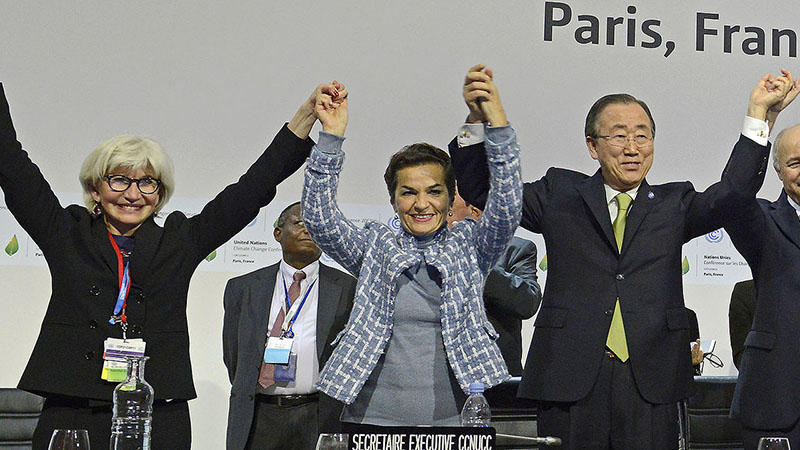Did a “landmark paper that exaggerated global warming” trick 195 governments into signing the Paris climate deal?
That’s the bold claim in a Mail on Sunday article that, at time of writing, had been shared 36,000 times and boasted 1,600 comments.
It’s a strong allegation, directed at a study from the reputable National Oceanic and Atmospheric Administration (NOAA), and one that was pounced upon by climate sceptic lawmakers in the US.
“The Obama administration pushed their costly climate agenda at the expense of scientific integrity,” tweeted congressman Lamar Smith, a Republican who says climate science is bunkum.
There are signs Smith and other US lawmakers will use the story to bolster their calls for NOAA to be defunded and the US to pull out of its international climate commitments.
The agency accused of manipulating data is the National Oceanic and Atmospheric Administration (NOAA), a government body and one of the largest climate science institutions in the US. The man accusing it of this is John Bates, one of NOAA’s former employees and author of a long blogpost on data security and transparency over the weekend. A number of climate scientists have come to the defence of NOAA and the paper’s lead author Tom Karl, but too late to prevent the story’s spread across right-wing and conspiracy sites.
But is it true? Climate Home contacted 10 envoys and ministers involved in the Paris climate summit. Not one said this report made an iota of difference to its result.
“No single paper had a significant role in shaping the outcome of the conference,” Norway’s climate and environment minister Vidar Helgesen told this website.
“What mattered in Paris was the strong message from business and investors that we need to take climate risk seriously.”
An EU negotiator at the COP21 summit told Climate Home they “did not recall any discussion” of the NOAA paper during talks.
“We base our positions on the IPCC [UN science panel] and I don’t think those said we should do less because of a pause. We did not need extra encouragement.”
Editor-In-Chief of @sciencemagazine @jeremymberg just sent me this re Mail on Sunday article. Yellow is full response to @DavidRoseUK pic.twitter.com/DFMUqa4xS8
— Roz Pidcock (@RozPidcock) February 6, 2017
Andrew Light, a senior member of the US State Department’s negotiating team in 2015 said he was “incredulous” at the idea the paper had any influence on talks.
“Before we negotiated a single word in Paris, 188 countries had put forward pledges for the meeting,” he said. “You’re gonna tell me what got all of them to go through those discussions was based on one NOAA study?”
Oleg Shamanov, Russia’s top climate negotiator, told Climate Home the only “authoritative source” of climate science was the IPCC’s fifth assessment report (AR5).
“It’s my firm belief that it was politics, not science, that really influenced negotiations,” he said in an email.
The IPCC’s AR5 study was also cited as “the most influential science” by WWF-UK chief climate advisor Stephen Cornelius and New Zealand diplomat Jo Tyndall.
“The timing of its release made it the most valuable and authoritative scientific input, and the sheer weight of scientific opinion standing behind it was unmatched by any other reports,” Tyndall said.
Another veteran observer of over a decade of IPCC and UN talks said: “I can’t remember a single person referring to it afterwards at UNFCCC talks.
“Calling it ‘huge’ is nonsense since the IPCC also went on about uncertainties about the ‘hiatus’ in its reports.”
South African ambassador Nozipho Mxakato-Diseko, chief negotiator for the G77 group of developing countries in Paris was another to dismiss any link.
Me neither! But then again what is the yardstick for rigor & veracity for the DM https://t.co/TzWP2Y5EsD
— Amb. Mxakato-Diseko (@Amb_MxDiseko) February 6, 2017
Other “facts”included in the Daily Mail story demonstrate a loose grasp what actually was achieved in Paris.
The paper cites a pledge to deliver US$100 billion in climate aid by 2020, a warming ceiling of 2C and an EU pledge to cut emissions 40% by 2030 as areas agreed in Paris.
Yet these are all pre-Paris commitments signed off – in the case of the $100 billion – as early as 2010.
Also missing from the Mail’s report is acknowledgement that many climate scientists – and journalists – forensically questioned the study on its release in June 2015.
It received wide coverage: Reuters, the New York Times and BBC were among those who covered its release and claims that the so-called hiatus in global warming had been exaggerated.
Climate science is a matter of national security, says the Pentagon in Arctic strategy: https://t.co/Rlsdbcr6sA pic.twitter.com/6zurNqrrbm
— Climate Home News (@ClimateHome) February 6, 2017
It’s worth noting the study was challenged by other climate scientists at the time and the news reports carried their views. NASA’s Gavin Schmidt highlighted “uncertainty” in the study.
Thomas Stocker, a Swiss scientist who led the UN’s 2013 climate science study, was another who cautioned against reading too much into the report.
Piers Forster, a climate scientist at Leeds University, told the BBC this was “not the last word” and there was a need to better grasp “short-term fluctuations in climate”.
Two years on and global temperatures show little sign of stalling: 2017 is likely to be warmer than the long term average, said the Met Office last month, although it’s unlikely to beat 2015 and 2016 – the hottest years since records began.
Weekly briefing: Sign up for your essential climate politics update
